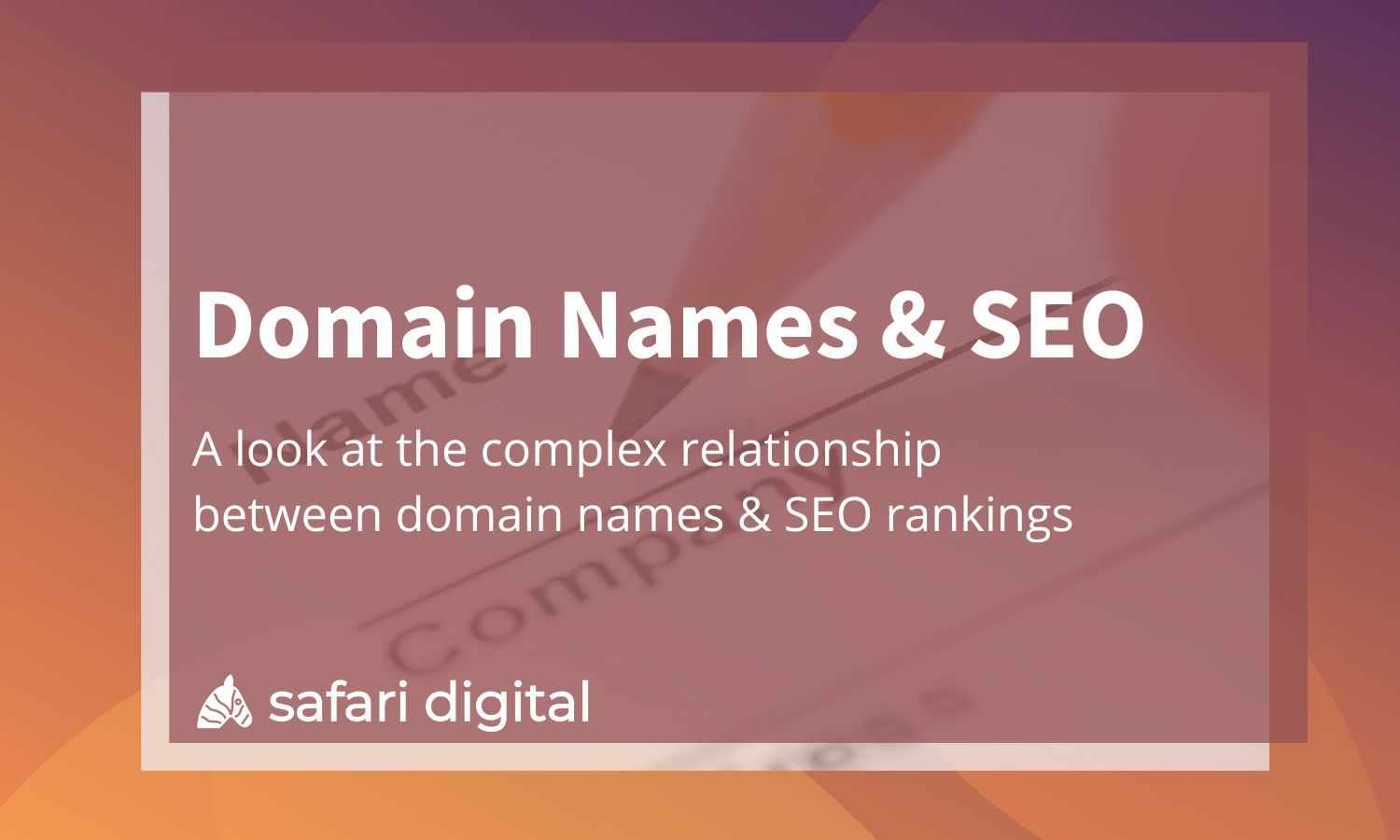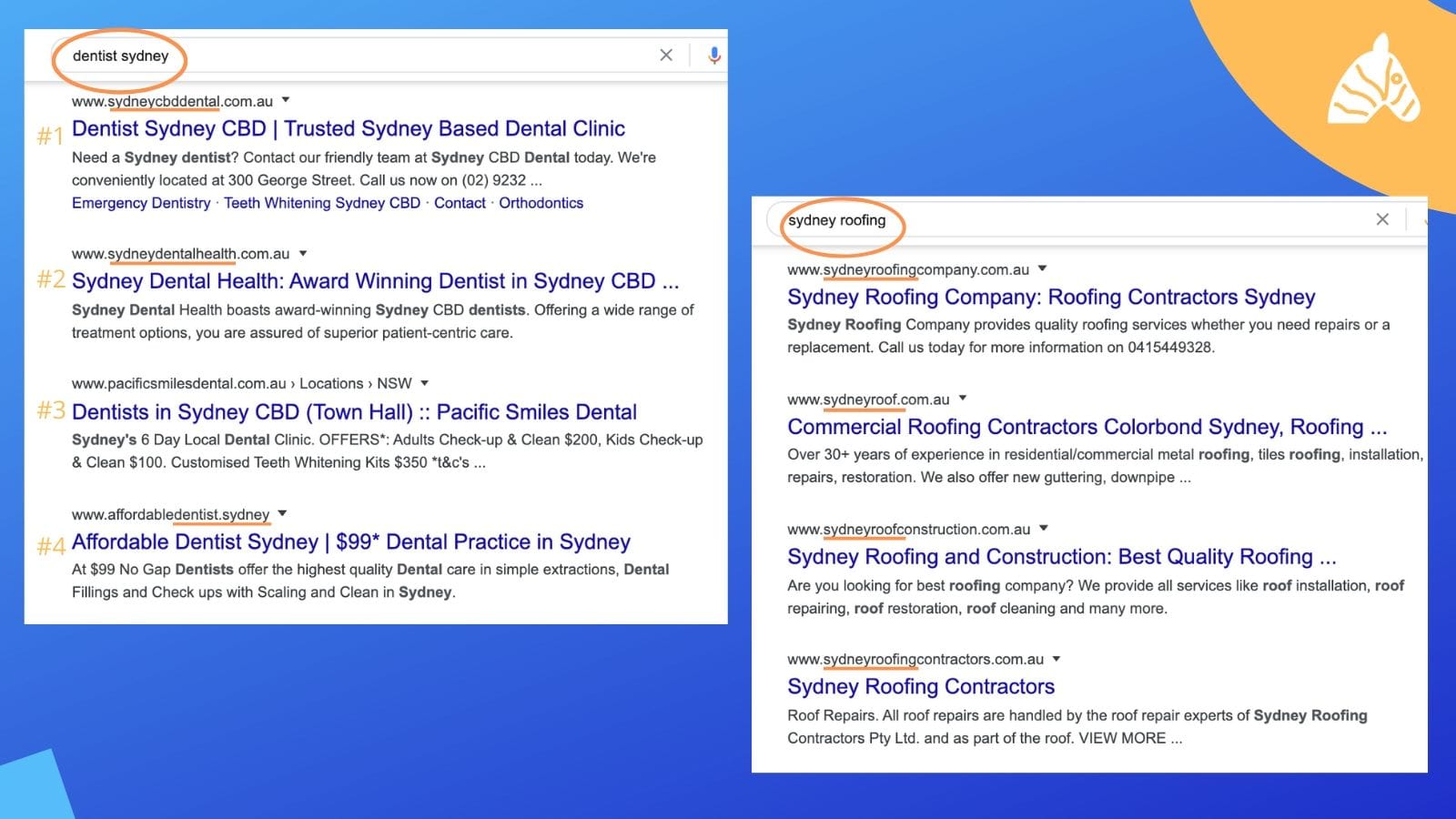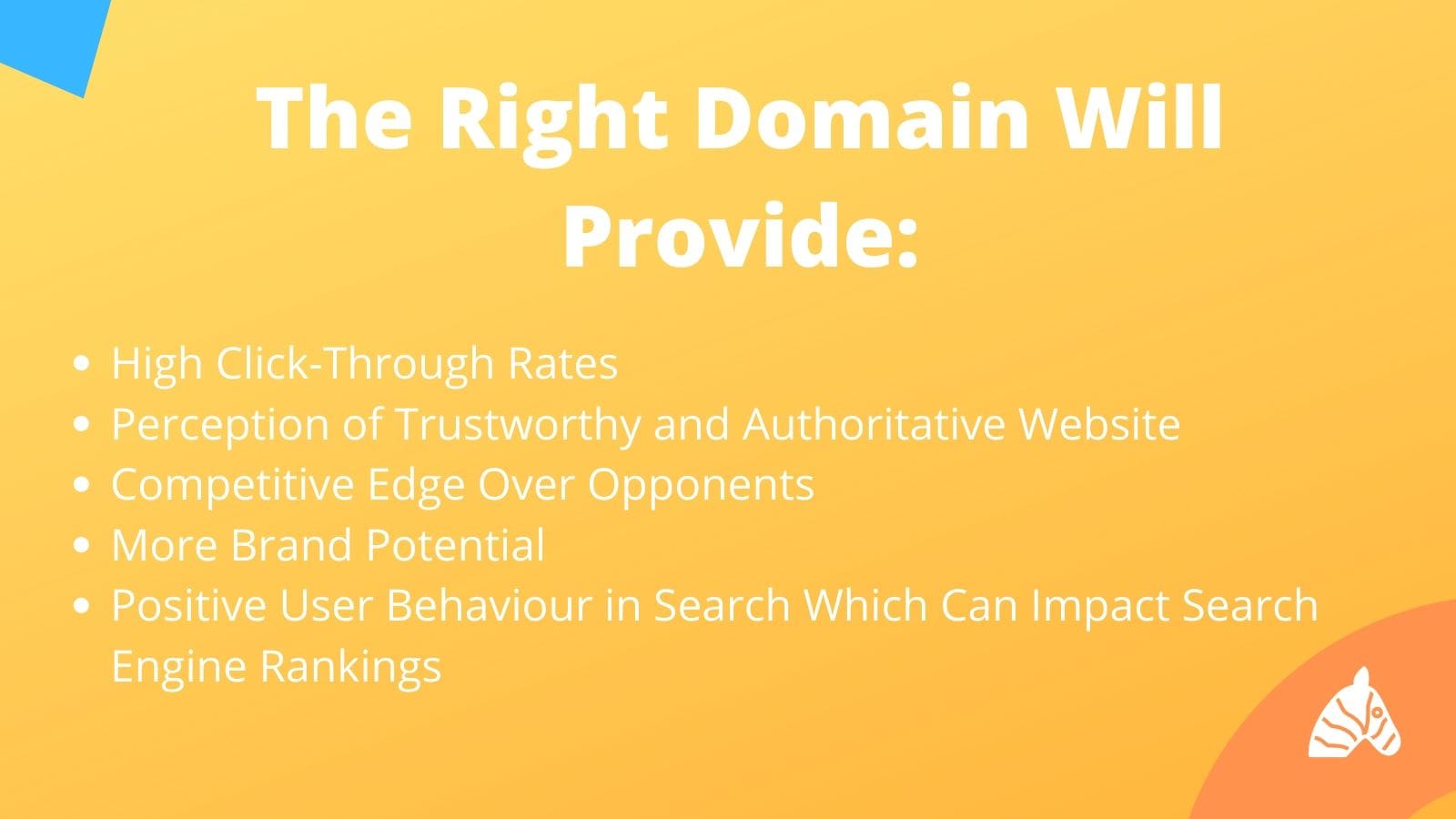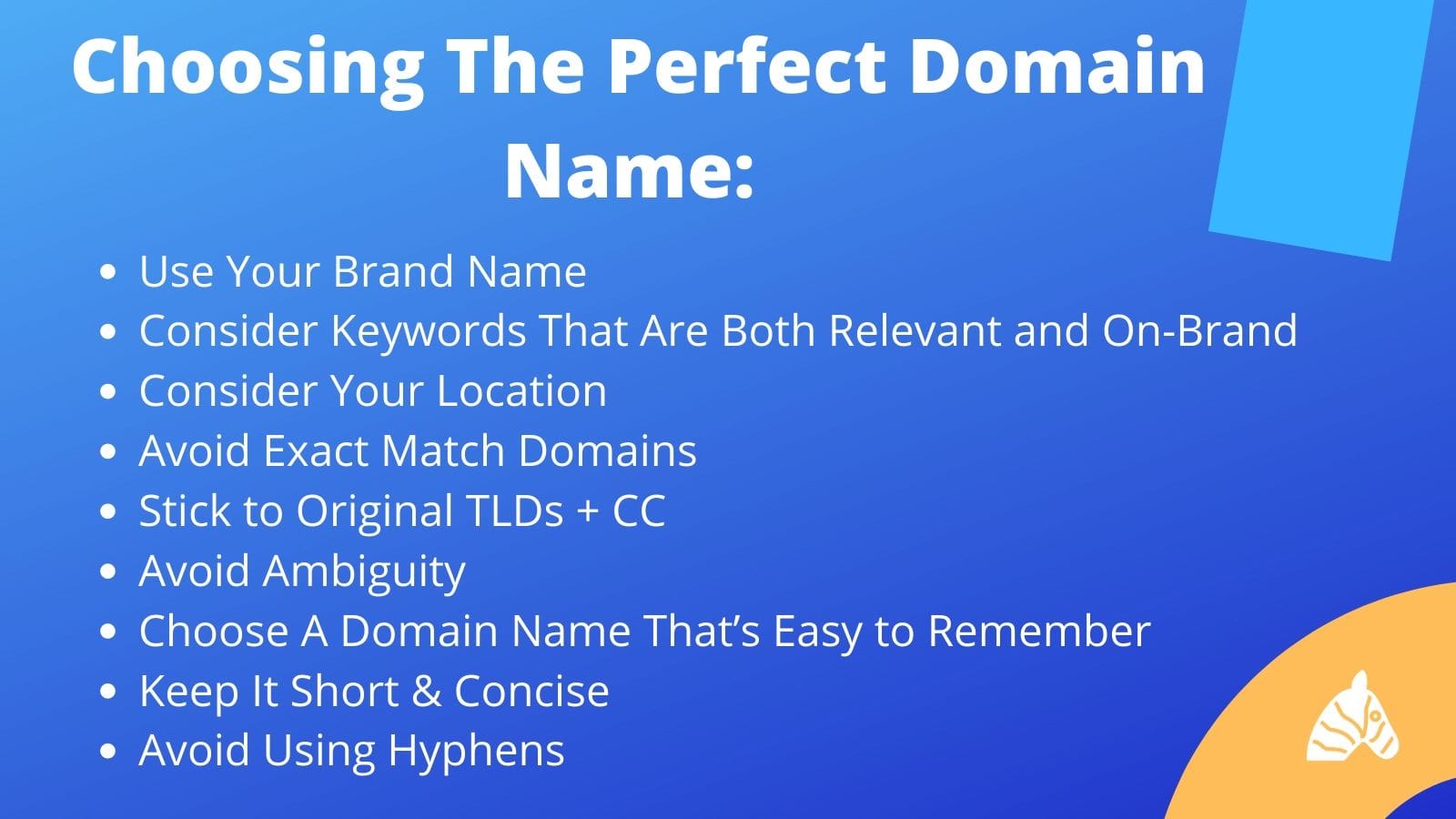
Does the name of your domain matter and how much importance should you place on choosing a domain name?
It’s a question that we get asked almost each week by an existing client that is asking about a new business or rebrand, or a would-be client that is considering the implications of their domain name for SEO success.
This article outlines the significance of choosing the right name, basic principles like exact match and partial match domains, and some of the considerations that you need to have when choosing the domain name for your business.
Table of Contents
What Is A Domain Name?
Before we jump into the specifics, let’s do some house keeping so that we are all on the same page.
Your domain name is your website name. The domain name is the address in which users can access your website. Domain names are generally used to identify one or more IP addresses. To use our website as an example, our domain name is safaridigital.com.au.
When we refer to www.safaridigital.com.au, (which is not that often):
The domain name is safaridigital.com.au
The subdomain is www.
The top-level domain (TLD) is .com
With a country code of .au

Can Your Domain Name Impact SEO?
Yes, but keywords are not the be-and-end-all of SEO for domain names. When looking at domain names, you obviously want people to recognise your brand, your business, and what you offer. An SEO-optimised domain name is one that is relevant, branded, and communicates the purpose and content of the website.
First things first, you do not need to have keywords in your domain name to get your site to rank well. Search engines are well aware of keyword-stuffing in domain names and actively discourage site owners creating domain names that are exact match domains (EDMs).
Instead, you should focus on creating a domain name that is well-branded and best for your business offerings. Building a consistent and well-branded online presence will intertwine with SEO efforts. While your domain name is an important part of your website, the name itself carries little weight amidst the 200 ranking factors that Google uses to determine where your site will appear in search results.
How Does Domain Name Affect SEO?
While they aren’t a major ranking factor, domain names can have significant impacts on SEO. Using a mix of relevant and branded words to create a short, concise, and click-worthy domain name will significantly increase your chances of ranking well in search engines. However, using exact-match keywords and over-optimising your domain name can make your website look spammy and will decrease your chances of ranking well. It’s all about striking the right balance.
If we take a look at just the domain name of a website, it is undeniable that having the right keywords used in a domain name can significantly improve your chances of ranking well in search engines. However, that does not mean that exact-match domains are always going to rank first. In 2012, Google reduced the number of exact-match domains ranking well in an effort to rid search results of spammy and keyword-stuffed websites.
For example, if we search for service-based businesses with the term “Sydney”, many of the websites ranking first have “Sydney” and the service keyword in the domain name. The trick here is that they have all managed to find domain names that are relevant, optimised, brand-centric, and work in conjunction with other search ranking factors to rank well.

Domain names can have a massive effect on SEO. Having the most relevant and fitting domain name can help to target your relevant audience and accelerate your search ranking placement. But it does come down to more elements than keywords – you first need to have a well-optimised website for your domain name to do you any favours.
Do Domain Names Help With SEO?
As a business owner, selecting a domain name is a pretty important task as it will become the business’ brand identity.
So while Google may have confirmed that domain names do not contribute to search engine rankings like they previously have, the right domain name can provide:
• High Click-Through Rates
• Perception of Trust and Authority
• Competitive Edge Over Opponents
• More Brand Potential
• Positive User Behaviour Which Can Impact Search Engine Rankings

If you want to get the most SEO value out of your domain name, you need to think about striking a balance between an over-stuffed domain, and a domain that is well branded; it’s all about sending the right signals.
Partial match or exact match domain names can be both beneficial and limiting for your SEO efforts. For instance, if Safari Digital were to be called ‘Perth SEO Company‘, then our rankings in Western Australia may see a slight improvement, but our rankings on the east coast would suffer. While choosing a partial or exact match domain can provide a short term boost, they can also limit scalability.
It is well-known within the SEO community that Google can penalise exact-match domains if the owner is not careful about how they manage the content of the website. So, while domain names should be focused on reflecting the brand, having an SEO-friendly domain name can certainly help your efforts.
Top Level Domains
Top level domains (TLDs) are the most common domains and have a global reach. Global reach means there are no limits by industry or location, and anyone can create a TLD. Originally designed for sites in the US, “.com” domains are by far the most popular TLDs.
One way you can make your domain more SEO-friendly is to use country code top level domains (ccTLDs). ccTLDs provide an extra layer of information to the search engine that helps to narrow down the relevant results to the user searching. A ccTLD helps search engines understand your site and audience through the geographical location. For example, using “.com.au” lets Google know that your business is Australian. Using ccTLDs can significantly impact where and when your website will present in search engine result pages. If your site has a “.co.uk” domain name, there’s a high probability it will not reach Australian users for most search terms.
Does A Hyphen In the Domain Name Affect SEO?
In short, yes. We do not recommend using hyphens in domain names.
If two words make up your domain, like “www.safariexample.com”, you may be tempted to separate the words with a hyphen for readability purposes, and make it “www.safari-example.com”.
The use of hyphens strongly correlates with spammy behaviour and will decrease the domain name readability and fluency. For that reason, it is not recommended that hyphens be used in domain names. If you must, make sure not to use more than one.
One of the main reasons hyphenated domain names look so spammy is that this is a common practice for spammers who attempt to create “knock-off” versions of well-known authority websites. The original domain name is already taken, so they register a hyphenated version to try to replicate the website and the brand.
Search engines and users will both be put off by a hyphenated domain name. It doesn’t read well, and they closely correlated with a poor-quality website. If you can, avoid using hyphens in your domain name.
How To Choose Domain Name for SEO
Choosing your domain name should not purely focus on SEO; instead, your domain name choice should focus on what your website is offering. If your domain name accurately reflects your website and brand, that in itself is good SEO. Here are some of our top tips for choosing a domain name:

• Use Your Brand Name
• Consider Keywords That Are Both Relevant and On-Brand
• Consider Your Location
• Avoid Exact Match Domains
• Stick to Original TLDs
• Avoid Ambiguity
• Choose A Domain Name That’s Easy to Remember
• Keep It Short & Concise
• Avoid Using Hyphens
A Domain name for SEO will involve creating a name that perfectly fits your business and brand. Back in the day, if you create an exact-match domain name for your target keywords, you’d automatically rank well. However, as Google’s algorithm has become more sophisticated, having an exact match domain name today does not mean your site will automatically rank number one.
Back in 2012, Google underwent some significant changes in order to reduce low-quality exact match domains in search results. While there are still plenty of websites that will rank with exact match domain names, it’s best practice to avoid over-stuffing your domain with your target keywords.
If you want to get the most value out of your domain name, you need to be sending the right signals. You need to create an SEO-friendly domain without creating a spammy perception. Focus on your brand, your business offerings, and using a domain name that will have users wanting to learn more about your website.
As mentioned earlier, Google strives to meet the demands of users. So, when deciding on a domain name, you first need to consider your customers. Your domain name should:
• Not Give the Perception of a Spammy Website
• Be Recognisable, Memorable, and Readable
• Be Relevant and Sound Legitimate
• Brand Your Business
• Have a Strong Correlation to Who You Are and What You Do
Wrapping it up
Creating an SEO-friendly domain name means so much more than using relevant keywords. Creating a domain name that will positively impact SEO efforts includes focusing on branding that users will love. When creating your domain name, think to yourself “is this something I would click on?”, because whether users interact with your domain should be your primary concern.
Gone are the days in which you could rely on an exact-match domain to rank well in search engines. Ranking well in relevant search terms comes down to so much more than the right domain – a well thought out domain name is just one small building block for a high-quality website.






